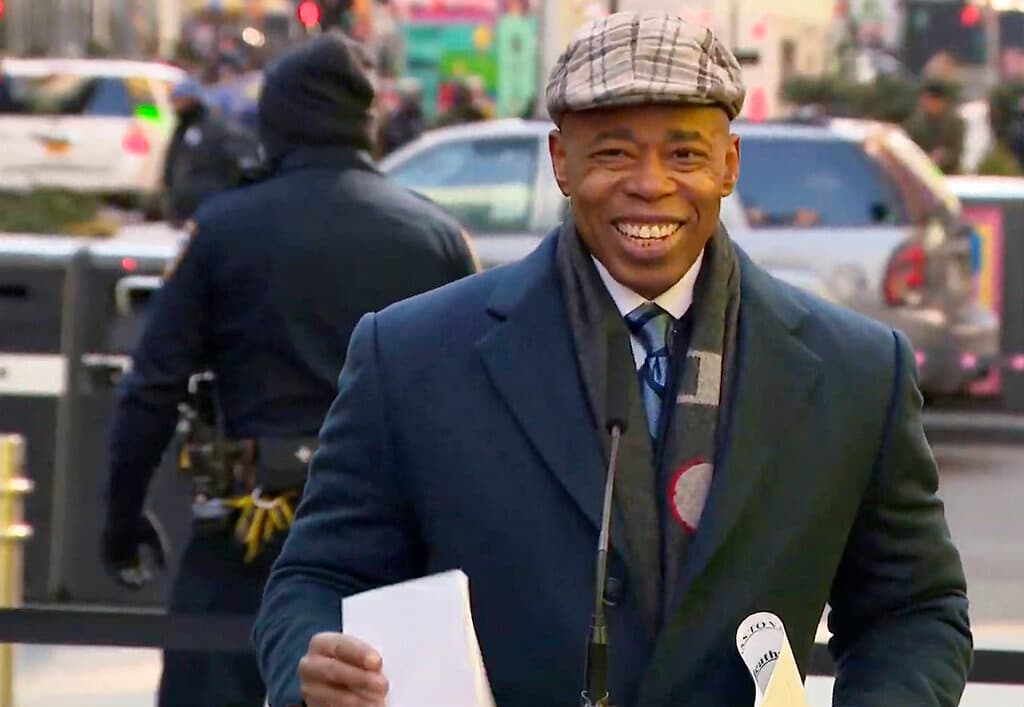At 100 Days, Mayor Adams Is Feeling Good and Is Ready To Fight Crime
‘When does the hard part start?’ he asks.

Mayor Adams is feeling good. Recapping his first 100 days, His Honor gives himself a nine out of 10. “The foundation has been put in place, our anti-gun unit is cleaning out streets, we are taking down the [homeless] encampments, and bringing jobs back.”
The mayor speaks with the Sun in a Zoom call from the passenger seat of a van. He is wearing a trim shirt and a purple tie, but has set aside his jacket. He interrupts the conversation once to take a call from an aide. He has been up and operating, he says, since the pre-dawn hours.
“We’re looking at improving on our educational system with an amazing chancellor that we appointed. Our youth are involved in a hundred-thousand summer youth jobs…. We are moving in the right direction. In the first 100 days, we laid the foundation that we are going to build on to make sure that this city comes back bigger — stronger than ever — but we’re going to do it in an equitable way. We don’t leave anyone behind again.”
The mayor is asked whether he believes that the spike in crime the city has seen recently vindicates critics who warned of trouble after a United States district court in 2013 ordered an end to the police department’s stop, question, and frisk program.
“No, not at all,” Mr. Adams replies. “It wasn’t the ruling of Floyd that impacted us in any way. I use the analogy of rivers because there are many rivers that feed the sea of violence, and we have to dam each one.
“We have to dam the river of criminal justice reforms that we witness in Albany…. We have to dam the rivers of guns that are flowing in our city.”
In the past 90 days, the mayor says, “we removed over a thousand guns off our streets. That’s over approximately 10 guns a day, and yet they keep coming in our city. And then we have to remove the river that creates violence in the first place.”
At one point, the mayor was asked to characterize his own view of criminal punishment — whether he sees it as deterrence, rehabilitation, or getting people off the street. He cocks his head and says that it’s a good question. Then he muses that the reason it’s “so significant” that he is in the position of mayor is that “what we do here in New York is going to cascade throughout the entire country.”
Then the mayor asserts that “the city and country, for the most part,” are “divided — either everyone should go to jail or no one should go to jail, no matter what crime they do. I don’t subscribe to either of them, and oftentimes take criticism, because I know we could have justice and public safety.”
Instead, he argues, we need to “look at the offense based on that offense, particularly those first-time offenses that are non-violent in nature, and give people the support and services they need, so they don’t become career criminals.”
“But,” he argues, “those career criminals who have made up their mind that they’re going to inflict violence on innocent people … particularly when we talk about gun violence and other violent crimes, they need to serve time in jail for their actions. And while they’re in jail, they should get services so they don’t continue to be repeat offenders.”
Mayor Adams also makes it clear that homeless persons will no longer be allowed to sleep on the street and are actively being removed by the police. He says that he is in “real-time” communication with the team involved on a daily basis.
“I have every police sector in our city doing a canvas of their precinct sectors. If they identify a homeless encampment, they immediately notify the patrol borough … and it kicks in gear … we zero in on that encampment, we give them a notification. Then in 24 hours, we start to process removing it.”
“We are not going to stop,” the mayor says. “We’re not going to do a one-time initiative.…We’re going to do repeated inspections. And you’re gonna find some that are going to go home, back to their residences. You’re going to find others that are going to go to the shelters that are available. And you’re going to find some that are going to try to put another tent up somewhere, but we’re going to be right there to say, this is not acceptable for people to live in this inhumane fashion.”
“Listen, in some of those tents, we found human waste. We found needles … it’s inhumane for people to live like this and us to ignore that. And I’m not gonna allow that to happen in our city.”
The mayor rebuffs reports that homeless people say shelters are so violent that they would rather live on the streets. “Violence is on the streets,” Mr. Adams says. The mayor adds that he has been visiting shelters early in the mornings — “1 a.m., 2 a.m., 3 a.m.” — “to see the conditions people are in.” He insists that shelter residents “get a safe bed,” “three meals a day, access to a shower, access to a caseworker” to help them find “permanent housing and employment.”
On education, the mayor affirms his support for standardized testing and for gifted-and-talented programs. He promises to leave “alone” the city’s five gifted-and-talented high schools and their admissions processes, while building in each borough a new specialized high school that “uses a different criteria that doesn’t have to only be standardized testing,” so we don’t lose good, talented children.
“Being gifted and talented,” he argued, “is more than your ability to take an exam.”
The mayor was asked about the city’s competition with Florida — starting with his decision to run a billboard campaign inviting Floridians who’ve grown uncomfortable since Florida’s enactment of what is often called the “don’t say gay” law to come to New York. Mayor Adams stands by the billboards but makes clear that he understands that the main reason New Yorkers have left for Florida is because of crime.
“When I speak to my high income earners here in the city,” Mr. Adams said, “let me tell you what they share with me over and over again: They say we are concerned about the taxes in New York. LA is the only place that beats us in high taxes, but they say, ‘You know what? We would pay our taxes, but are we getting a good product that we deserve?’ The no. 1 issue I hear is the quality of life, public safety.
“They say, ‘Eric, I did not feel safe. I did not feel my children could walk the streets safely.’ Remember, before they fled, taxes were high but you see this mass exodus now because people are afraid to be on the subways. They’re afraid to walk the streets. They’re afraid to sit in restaurants, without someone robbing them for their watches. They’re afraid for their children to move around.”
“We remove that fear and bring about the safety that this city deserves,” he said, “you’re going to see people coming back because … there’s only two types of Americans — those who live in New York and those who wish they could … they’ll be back. Trust me.”
In the meantime, it is clear the mayor is having a blast. People, he says, tell him that he has “the second-hardest job” in politics. “I have to be honest,” he says, “when does the hard part start? I don’t feel overwhelmed. I don’t feel in any way stressed out…. There have been some extremely painful moments … but every day I wake up with that excitement, every day is like the first day. And I pinch myself to say, this is not a job. This is a love affair I have with New York.”
To a last question, Hizzoner discloses that he has some fancy taste: Turns out, his favorite place for a late-night snack is Zero Bond.

